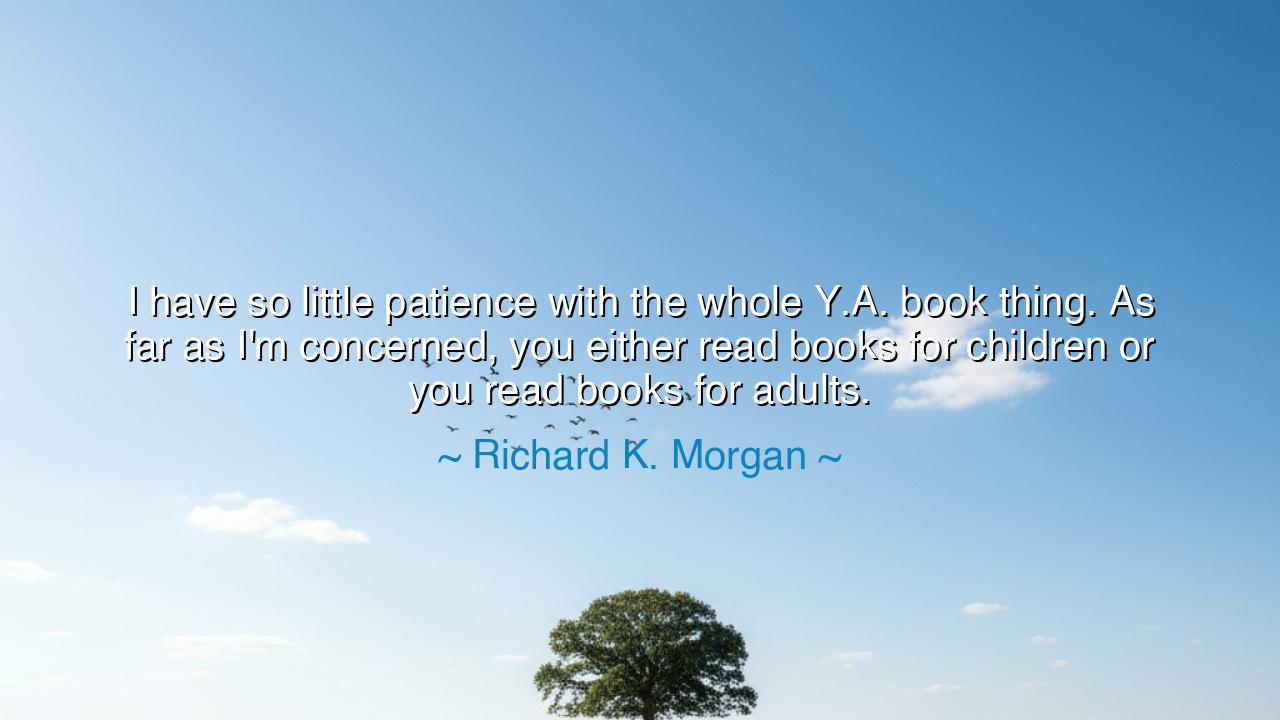
I have so little patience with the whole Y.A. book thing. As far
I have so little patience with the whole Y.A. book thing. As far as I'm concerned, you either read books for children or you read books for adults.






Richard K. Morgan, known for weaving grim and unflinching tales of the future, once declared with frankness: “I have so little patience with the whole Y.A. book thing. As far as I’m concerned, you either read books for children or you read books for adults.” His words, sharp as a blade, strike at the heart of how we divide literature. To some, his stance may seem severe, even dismissive, but hidden in his declaration is a challenge to our age: to ask what stories are for, and whom they are meant to shape.
The meaning of Morgan’s statement lies in his impatience with Y.A. (Young Adult) fiction as a distinct category. In his eyes, the world of storytelling is already divided into two great realms: the realm of children’s literature, which nurtures the young with lessons, imagination, and growth, and the realm of adult literature, which confronts the soul with complexity, darkness, and the burdens of maturity. To create a middle ground, he argues, is to blur the line unnecessarily, to diminish the power of both worlds. For the child must one day step into the world of the adult, and literature, like a guide, must not coddle the passage with too much softness.
History offers us parallels. In the ancient world, tales were told not for children or adults separately, but for all. The Iliad and the Odyssey, sung by bards, contained both the wonder that stirred a boy’s imagination and the sorrow that wrung the heart of a grown warrior. Likewise, the fables of Aesop or the parables of the Bible spoke across ages, simple on the surface yet layered with meaning for those who listened with deeper ears. Categories, as Morgan reminds us, are a modern creation, not an eternal one. Perhaps his impatience is with this modern tendency to dilute stories with labels that keep us comfortable, rather than challenge us to grow.
And yet, his statement is not merely criticism; it is a call to honesty. Patience runs thin for him not because stories for young readers lack value, but because he believes they should not be disguised as something in-between. A story for a child should embrace the innocence and guidance needed for that stage. A story for an adult should not shrink from the weight of consequence, the full measure of life. To place too much emphasis on a “young adult” space, Morgan suggests, risks trapping readers in a prolonged adolescence—hesitant to face the full weight of maturity, yet unwilling to embrace the freedom of childhood wonder.
Consider the rise of Harry Potter. It began as a children’s tale, filled with whimsy and light. But as the readers aged, so too did the story darken, growing into themes of war, sacrifice, and death. Here we see the natural progression Morgan honors: literature should either speak to the child and prepare them for life, or it should meet the adult head-on in all its stark reality. What he resists is the creation of an artificial middle realm, one that flatters both but fully satisfies neither.
The lesson, then, is this: do not fear to step into the story that challenges you. If you are young, read what nurtures and guides you. If you are grown, read what pierces, questions, and reveals. Do not linger endlessly in the spaces of comfort, for literature is meant to shape, to sharpen, to awaken. Books are tools of transformation, and to misuse them is to remain stagnant, neither child nor adult in spirit.
Therefore, O seeker of wisdom, let Morgan’s words be taken not as scorn, but as exhortation. Choose your stories with courage. Do not cling to the in-between out of fear, but embrace the stage you are in—whether child or adult—with honesty. For in doing so, you will drink fully from the well of literature, which was never meant to flatter you, but to forge you. And remember always: a story’s true power is not in the category it wears, but in the truth it leaves carved upon your soul.






AAdministratorAdministrator
Welcome, honored guests. Please leave a comment, we will respond soon